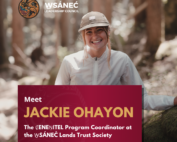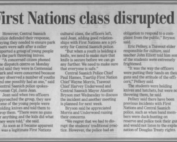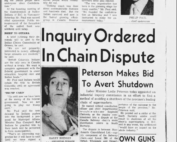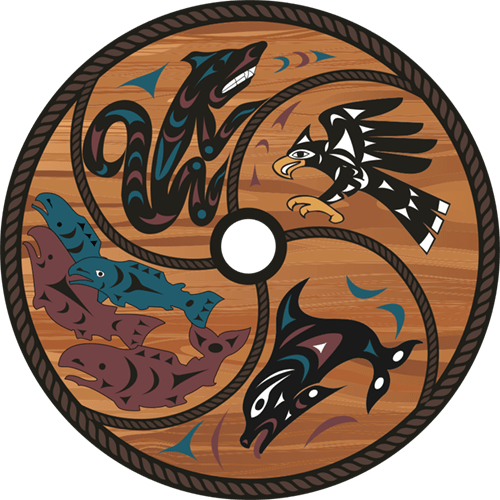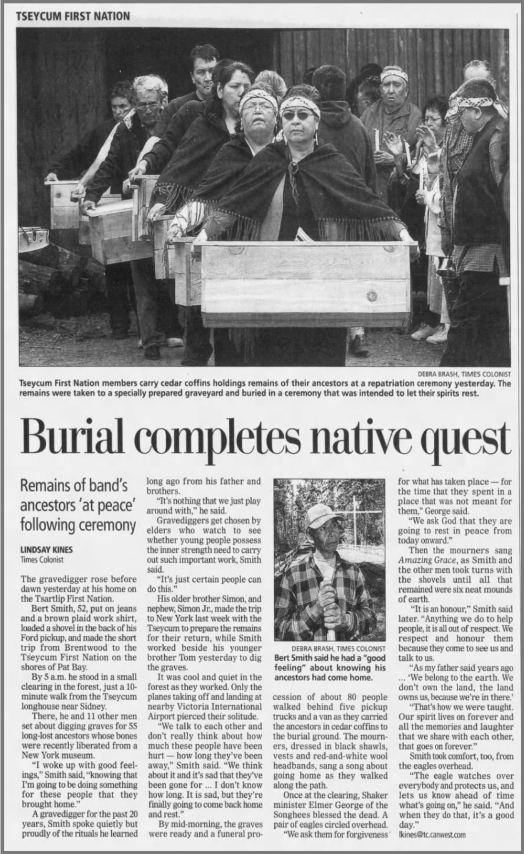
Times Colonist: June 14, 2008
[IMAGE]
DEBRA BRASH, TIMES COLONIST
Tseycum First Nation members carry cedar coffins holding remains of their ancestors at a repatriation ceremony yesterday. The remains were taken to a specially prepared graveyard and buried in a ceremony that was intended to let their spirits rest.
Burial completes native quest
Remains of band’s ancestors ‘at peace’ following ceremony
LINDSAY KINES
Times Colonist
The gravedigger rose before dawn yesterday at his home on the Tsartlip First Nation.
Bert Smith, 52, put on jeans and a brown plaid work shirt, loaded a shovel in the back of his Ford pickup and made the short trip from Brentwood to the Tseycum First Nation on the shores of Pat Bay.
By 5 a.m. he stood in a small clearing in the forest, just a 10-minute walk from the Tseycum longhouse near Sidney.
There, he and 11 other men set about digging graves for 55 long-lost ancestors whose bones were recently liberated from a New York museum.
“I woke up with good feelings,” Smith said, “knowing that I’m going to be doing something for these people that they brought home.”
A gravedigger for the past 20 years, Smith spoke quietly but proudly of the rituals he learned
long ago from his father and brothers.
“It’s nothing that we just play around with,” he said.
Gravediggers get chosen by elders who watch to see whether young people possess the inner strength needed to carry out such important work, Smith said.
“It’s just certain people can do this.”
His older brother Simon, and nephew, Simon Jr., made the trip to New York last week with the Tseycum to prepare the remains for their return, while Smith worked beside his younger brother Tom yesterday to dig the graves.
It was cool and quiet in the forest as they worked. Only the planes taking off and landing at nearby Victoria International Airport pierced their solitude.
“We talk to each other and don’t really think about how much these people have been hurt – how long they’ve been away,” Smith said. “We think about it and it’s sad that they’ve been gone for … I don’t know how long. It is sad, but they’re finally going to come back home and rest.”
[IMAGE]
DEBRA BRASH, TIMES COLONIST
Bert Smith said he had a “good feeling” about knowing his ancestors had come home.
By mid-morning, the graves were ready and a funeral procession of about 80 people walked behind five pickup trucks and a van as they carried the ancestors in cedar coffins to the burial ground. The mourners, dressed in black shawls, vests, and red-and-white wool headbands, sang a song about going home as they walked along the path.
Once at the clearing, Shaker minister Elmer George of the Songhees blessed the dead. A pair of eagles circled overhead.
“We ask them for forgiveness for what has taken place – for the time that they spent in a place that was not meant for them,” George said.
“We ask God that they are going to rest in peace from today onward.”
Then the mourners sang Amazing Grace, as Smith and the other men took turns with the shovels until all that remained were six neat mounds of earth.
“It is an honour,” Smith said later. “Anything we do to help people, it is all out of respect. We respect and honour them because they come to see us and talk to us.
“As my father said years ago … ‘We belong to the earth. We don’t own the land, the land owns us, because we’re in there.’
“That’s how we were taught. Our spirit lives on forever and all the memories and laughter that we share with each other, that goes on forever.”
Smith took comfort, too, from the eagles overhead.
“The eagle watches over everybody and protects us, and lets us know ahead of time what’s going on,” he said. “And when they do that, it’s a good day.”
Ikines@tc.canwest.com


